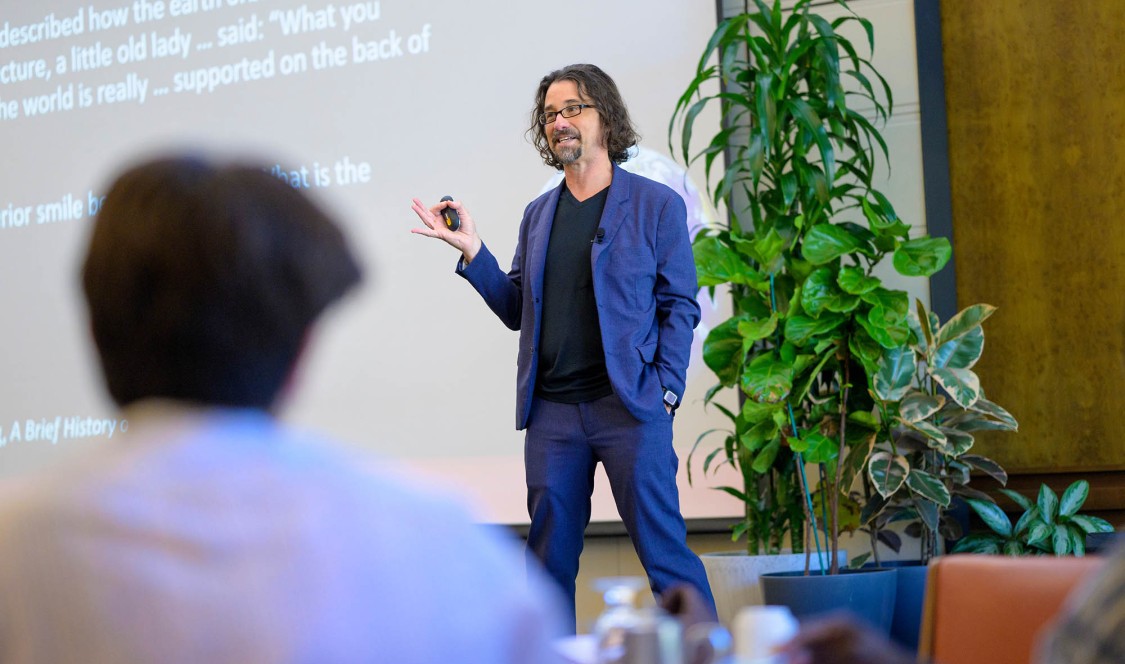About the Gould Chair
Shirley H. Gould P’65 and her son Edward S. Gould ’65 left a meaningful mark on Claremont McKenna College through their generosity and dedication to education and philanthropy. Together, Shirley and Edward established the Shirley H. Gould Professorship of Humanities. Edward was a local activist and philanthropist, who served on CMC’s Board of Trustees. After his passing in 1996, his mother renamed the professorship in his memory.
On the first day of class, Professor James Kreines takes his students through an imagination exercise.
He asks his students, “Think of a moment when you challenged yourself to do something that was legit hard for you, but where you persisted through the difficulty, and gained greater mastery—and enjoyed that feeling of gaining greater mastery. And then, said to yourself, ‘Let’s do that again. Let’s set it higher.’”
For Kreines, who was recently installed as the Edward S. Gould Professor of Philosophy at CMC, it’s a lesson that will be applied throughout the semester in courses such as “Kant to Hegel,” and “Buddhist Philosophy.” As his students grapple with the challenges of thinking deeply and engaging in intellectually rigorous classroom discussions, they are laying the groundwork for the semester.
“We want it to be hard,” Kreines continued. “Because when it feels hard during the semester, students know that what I want them to do is find that feeling of resistance or difficulty and go at it, not shirk from it, but face it. And I want them to think of that in context of how rewarding it feels when you make progress at something. We want to make a community, a group that helps one another do that.”
Outside the classroom, Kreines focuses his academic research on the history of European philosophy. He has authored Reason in the World: Hegel’s Metaphysics and Its Philosophical Appeal, and published numerous articles on Kant, Hegel, and post-Kantian European philosophy. In 2014, Kreines was a Visiting Scholar at the Institut für Philosophie, Humboldt-Universität zu Berlin, and in 2019, he served as a Dahlem Guest Fellow at the Dahlem Humanities Center, Freie Universität Berlin. He is currently finishing a short book on Hegel and Spinoza, and beginning a long one on the idea of a system in German philosophy.
“The general philosophical questions I am interested in are questions like: ‘What is the nature of value? What is the nature of reality? And, ultimately, how do the answers to these questions relate to one another?’” he said. “I also have a historical focus: German philosophy from Kant to Hegel. So, I am interested in how these philosophers answer these questions. And especially in how we can learn to better understand the questions, and the best kinds of answers, by escaping the here and now, and seeing very different ways of thinking.”
These are questions he further explored in his Oct. 22 faculty installation talk, “The Mission of Intellectual Vitality in Teaching and Research and the Crossroads of Kant’s Contradiction of Reason.”
Citing a portion of CMC’s mission to promote “faculty and student scholarship that contributes to intellectual vitality,” Kreines said, “There are some kinds of thinking that are so remote from how we ordinarily think about practical issues, and payoffs, that you couldn’t enter into this kind of thinking if you only wanted to do things that would pay off for you. But, if you can let go of that concern, then you can learn to think in ways that are enjoyable, not as a kind of payoff, but because they contribute to a meaningful life, without need of payoff.”
Kreines joined the CMC Philosophy faculty in 2007, at a time when the department numbered “six active philosophers,” according to Heather Antecol, CMC’s Vice President for Academic Affairs and Dean of the Faculty and James G. Boswell Professor of Economics.
Speaking at Kreines’ faculty installation, Antecol noted that CMC’s Philosophy department has more than doubled its size, and that Kreines has been “instrumental in building the College’s Philosophy department.”
Antecol also cited a team of external reviewers, who in a ranking of Philosophy departments at liberal arts institutions, put CMC “among the very top, possibly the top” department in the country.

